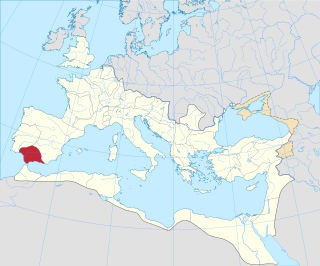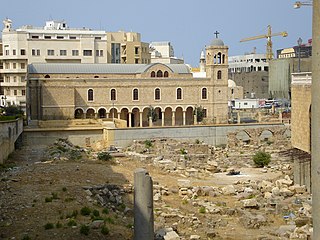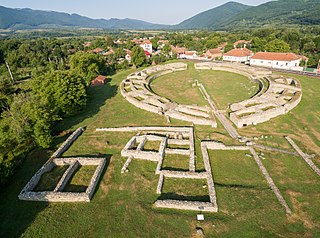
Lucius Septimius Severus was Roman emperor from 193 to 211. He was born in Leptis Magna in the Roman province of Africa. As a young man he advanced through the customary succession of offices under the reigns of Marcus Aurelius and Commodus. Severus was the final contender to seize power after the death of the emperor Pertinax in 193 during the Year of the Five Emperors.

The Severan dynasty, sometimes called the Septimian dynasty, was an Ancient Roman imperial dynasty that ruled the Roman Empire between 193 and 235, during the Roman imperial period. The dynasty was founded by the emperor Septimius Severus, who rose to power after the Year of the Five Emperors as the victor of the civil war of 193–197, and his wife, Julia Domna. After the short reigns and assassinations of their two sons, Caracalla and Geta, who succeeded their father in the government of the empire, Julia Domna's relatives themselves assumed power by raising Elagabalus and then Severus Alexander to the imperial office.

The Praetorian Guard was the imperial guard of the Imperial Roman army that served various roles for the Roman emperor including being a bodyguard unit, counterintelligence, crowd control and gathering military intelligence.

Legio III Gallica was a legion of the Imperial Roman army. The cognomen Gallica suggests that its earliest recruits came from veterans of the Gallic legions of Gaius Julius Caesar, a supposition supported by its emblem, a bull, a symbol associated with Caesar. The legion was based for most of its existence at Raphanea, Roman Syria, and was still active in Egypt in the early 4th century.

Roman Egypt was an imperial province of the Roman Empire from 30 BC to AD 641. The province encompassed most of modern-day Egypt except for the Sinai. It was bordered by the provinces of Crete and Cyrenaica to the west and Judaea, later Arabia Petraea, to the East.

Hispania Baetica, often abbreviated Baetica, was one of three Roman provinces created in Hispania on 27 BC. Baetica was bordered to the west by Lusitania, and to the northeast by Tarraconensis. Baetica remained one of the basic divisions of Hispania under the Visigoths. Its territory approximately corresponds to modern Andalusia.

A metropole is the homeland, central territory or the state exercising power over a colonial empire. From the 19th century, the English term metropole was mainly used in the scope of the British, Spanish, French, Dutch, Portuguese, Japanese, and Ottoman empires to designate those empires' home territories, as opposed to their colonial or overseas territories.

Latin rights or Latin citizenship were a set of legal rights that were originally granted to the Latins and therefore in their colonies. Latinitas was commonly used by Roman jurists to denote this status. With the Roman expansion in Italy, many settlements and coloniae outside of Latium had Latin rights.

Berytus, briefly known as Laodicea in Phoenicia or Laodicea in Canaan from the 2nd century to 64 BCE, was the ancient city of Beirut from the Roman Republic through the Roman Empire and Early Byzantine period/late antiquity. Berytus became a Roman colonia that would be the center of Roman presence in the Eastern Mediterranean shores south of Anatolia.

The history of ancient Lebanon traces the course of events related to the geographic area in the Eastern Mediterranean of what is now known as Lebanon from the beginning of antiquity to the beginning of Arab rule.

Mesopotamia was the name of a Roman province, initially a short-lived creation of the Roman emperor Trajan in 116–117 and then re-established by Emperor Septimius Severus in c. 198. Control of the province was subsequently fought over between the Roman and the Sassanian empires until the Muslim conquests of the 7th century.

Laodicea was a port city and important colonia of the Roman Empire in ancient Syria, near the modern city of Latakia. It was also called Laodicea in Syria or Laodicea ad mare. Under Septimius Severus, it was the capital of Roman Syria, and of the Eastern Roman province of Theodorias from 528 to 637 AD.
A Roman colonia was originally a settlement of Roman citizens, establishing a Roman outpost in federated or conquered territory, for the purpose of securing it. Eventually, however, the term came to denote the highest status of a Roman city. It is also the origin of the modern term "colony".

In the early Roman Empire, from 30 BC to AD 212, a peregrinus was a free provincial subject of the Empire who was not a Roman citizen. Peregrini constituted the vast majority of the Empire's inhabitants in the 1st and 2nd centuries AD. In AD 212, all free inhabitants of the Empire were granted citizenship by the Constitutio Antoniniana, with the exception of the dediticii, people who had become subject to Rome through surrender in war, and freed slaves.
Publius Septimius Geta was the father of the emperor Lucius Septimius Severus, father-in-law of the Roman empress Julia Domna and the paternal grandfather of the Roman emperors Caracalla and Geta. Besides mentions in the Historia Augusta, Geta is known from several inscriptions, two of which were found in Leptis Magna, Africa.

The history of the Roman Empire covers the history of ancient Rome from the traditional end of the Roman Republic in 27 BC until the abdication of Romulus Augustulus in AD 476 in the West, and the Fall of Constantinople in the East in 1453. Ancient Rome became a territorial empire while still a republic, but was then ruled by emperors beginning with Octavian Augustus, the final victor of the republican civil wars.

Ulpia Traiana Augusta Dacica Sarmizegetusa was the capital, the first, and largest city of Roman Dacia, named after Sarmizegetusa the former Dacian capital, located some 30 km away. It was founded in 106 as a colonia deducta and elevated to metropolis during the reign of Severus Alexander. The present village of Sarmizegetusa has been built over parts of it.
The Feriale Duranum is a calendar of religious observances for a Roman military garrison at Dura-Europos on the Euphrates, Roman Syria, under the reign of Severus Alexander.

Roman colonies in North Africa are the cities—populated by Roman citizens—created in North Africa by the Roman Empire, mainly in the period between the reigns of Augustus and Trajan.

The twin towns of Apulum were a major urban centre of Roman Dacia, nowadays completely covered by the city of Alba Iulia. They developed in the vicinity of the legionary fortress of Legio XIII Gemina: Colonia Aurelia Apulensis and Colonia Nova Apulensis.

















